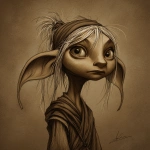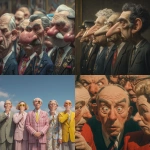Explore the Best AI Image Gallery

Quantum Creativity: Unlocking New Dimensions in the Creative Industry
The realm of creativity is poised for a paradigm shift as quantum computing emerges as a transformative force. This revolutionary technology, with its ability to process information at an unprecedented scale, holds the potential to reshape artistic expression, design processes, and the very nature of creative industries.
Beyond Classical Computation: A Quantum Leap for Creativity
Classical computers operate on bits, representing information as 0s or 1s. Quantum computers, however, harness the principles of quantum mechanics, utilizing qubits that can exist in a superposition of states—both 0 and 1 simultaneously. This unique capability allows quantum computers to perform calculations exponentially faster than classical counterparts, unlocking new possibilities for complex simulations, pattern recognition, and creative exploration.
Revolutionizing Artistic Expression
Quantum computing is poised to revolutionize artistic expression across various disciplines:
- Generative Art: Quantum algorithms can generate intricate and unpredictable patterns, leading to the creation of novel and awe-inspiring artworks that push the boundaries of imagination.
- Music Composition: Quantum computers can analyze musical structures and harmonies at a deeper level, enabling the composition of complex and emotionally resonant pieces that transcend traditional musical limitations.
- Interactive Installations: By integrating quantum sensing capabilities, artists can create immersive installations that respond to viewers movements and emotions in real time, blurring the lines between art and audience participation.
Transforming Design Processes
Quantum computing has the potential to streamline and enhance design processes across various industries:
- Product Design: Quantum simulations can optimize product designs for performance, durability, and aesthetics, leading to more innovative and efficient creations.
- Fashion Design: Quantum algorithms can analyze trends and consumer preferences, assisting designers in creating cutting-edge fashion lines that resonate with target audiences.
- Architecture: Quantum simulations can help architects optimize building designs for energy efficiency, structural integrity, and aesthetic appeal, leading to more sustainable and innovative structures.
Ethical Considerations
As with any powerful technology, quantum computing raises ethical considerations that require careful attention:
- Bias and Fairness: Quantum algorithms trained on biased data can perpetuate existing societal biases, requiring careful monitoring and mitigation strategies.
- Intellectual Property: The use of quantum computers for creative endeavors raises questions about ownership and copyright, necessitating the development of new legal frameworks.
- Access and Equity: Ensuring equitable access to quantum computing resources is crucial to prevent a widening gap between those who can leverage its benefits and those who cannot.
Future Trends
The future of quantum creativity holds immense promise:
- Quantum-Inspired Art: Artists will increasingly explore novel artistic mediums inspired by the principles of quantum mechanics, pushing the boundaries of creative expression.
- Hybrid Creative Processes: Quantum computing will augment human creativity, enabling seamless collaboration between artists and machines in design and production workflows.
- Personalized Creativity: Quantum algorithms can tailor artistic experiences to individual preferences, leading to highly personalized and engaging creative content.
Quantum computing is poised to usher in a new era of creativity, unlocking unprecedented possibilities for artists, designers, and innovators. By embracing this transformative technology responsibly, we can harness its power to shape a future where creativity knows no bounds.




](https://images.ai-img.art/thumbnails/150/546184a0cbf4b3d07f6ce10e72c0faf2a088fd4aac33c10422c11d76bf734be8.webp)
](https://images.ai-img.art/thumbnails/150/912c326dfe63108e4ca5cdcf408c2247b3e7d4afacde8aac324b06a9a4a6913c.webp)

](https://images.ai-img.art/thumbnails/150/f401da92914cabe9929e88ee4a02fbe744702d0c12dcbbd71efa8cf4cf1a6fee.webp)










](https://images.ai-img.art/thumbnails/150/7c569b0eb6e7eddaf8d96b3e3532d8b0de6a7d79916c0ef333632070a3085997.webp)





](https://images.ai-img.art/thumbnails/150/229d202f0ba192ad857509389a22aa5e3b948a813ee711996ae9d32631b486e0.webp)
](https://images.ai-img.art/thumbnails/150/5d3ed451a35bec12705494605ebbe909dc0f4319e9a6064ab824b39609ada54e.webp)

](https://images.ai-img.art/thumbnails/150/8561b450506900783584c556bf57ccab16188eb111ae0b9ec0cc34841b9a6825.webp)




](https://images.ai-img.art/thumbnails/150/76d26b409b1a7acfd86a78c5d5047ff9bd7be9ecf55ce838cc2c854bf42c00be.webp)





](https://images.ai-img.art/thumbnails/150/c064d275c74e06a80b37064ffe83a30913361f0a4602f9a669e8ecbdb37ec6ad.webp)


](https://images.ai-img.art/thumbnails/150/e3a2739669e7e25395e2cc5578f479057e60973d76d85724a5758b6e1039ee3c.webp)

](https://images.ai-img.art/thumbnails/150/2055d76bd9940ffa62a06896525d0f07a5b57bbe3b766a043d977b1c678d69c1.webp)





](https://images.ai-img.art/thumbnails/150/fe2cfa6e64066976325cd677ef63e43820c1843dc81bcf90c0b68dc300689e03.webp)